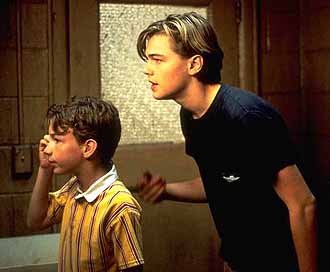




Adapted from a 1990 play, MARVIN'S ROOM teams two superb actresses - Diane Keaton and Meryl Streep - in an emotional drama about family illness, estrangement, and love.
Bessie (Diane Keaton) is a 50-ish woman who has devoted her life to caring for her totally incapacitated father, Marvin (Hume Cronyn)< and eccentric aunt, Ruth (Gwen Verdon). For 20 years, she has been out of touch with her younger sister, Lee (Meryl Streep), a hairdresser and single mother with two sons, Hank (Leonardo DiCaprio) and Charlie (Hal Scardino). When Hank, a roubled 17-year-old, deliberately burns down their home, he is placed in a mental institution.
Bessie is diagnosed with leukemia, and Lee and her two boys are summoned from Ohio to Florida as potential bone marrow donors. After they arrive, Bessie exhorts her sister to be ready to step in as family caregiver if necessary. Lee refuses, her freedom is more important to her, and the sisters exchange bitter words. Meanwhile, Bessie and Hank establish a friendly relationship with each other. The sisters quickly reconcile and become close for the first time in their lives. Then Bessie's doctor (Robert De Niro) reports that her bone marrow doesn't match up with that of her sister or either of her nephews.
Having been given the nedical equivalent of a death sentence, Bessie philosophizes that the opportunity to devote herself to looking after her father and aunt has made her life a rich and full one. As the story ends, it appears that Lee is seriously considering remaining in Florida and assuming her selfless sister's family role.
In the original theatrical production, Marvin is never seen. He does, however, appear prominently in the movie, although he is given no dialogue. Except for this revision, plus the additions of a trip to Disney World and a cliched scene in which Hank and Bessie take a joyride in the family car through the surf. MARVIN'S ROOM remains quite close to its source. The film, which appears to contain less dialogue than the play, is generally well acted. The sobriety of the theme is relieved by frequent comic touches, some of them successful (the droll performances of De Niro as the physician and Dan Hedaya as his totally clueless brother-assistant), some of them less so (the occasional cheap laugh induced by Aunt Ruth, who at one point advises Bessie, "You don't make stinky often enough.").
Like all screen adaptions of plays, MARVIN'S ROOM loses something in translation; but it remains admirable for its honest examination of a potentially depressing subject matter and for limning the joys of caring for others without sidestepping the accompanying pain and sacrifice. The drama might have been more effective if the estrangement between the sisters ran a bit deeper and their battles with each other were a little less theatrically direct.
The author of MARVIN'S ROOM, Scott McPherson, died of aids at the age of 33, shortly after his play's New York premiere.
This movie review is from The TV Guide Entertainment Network